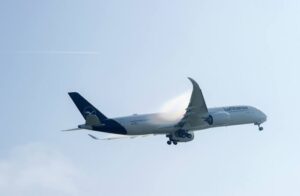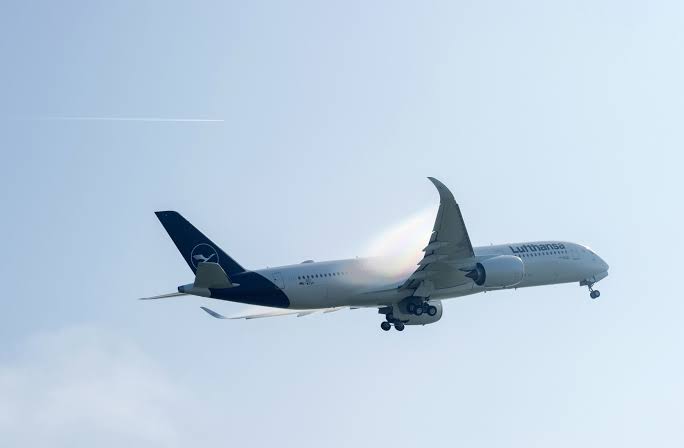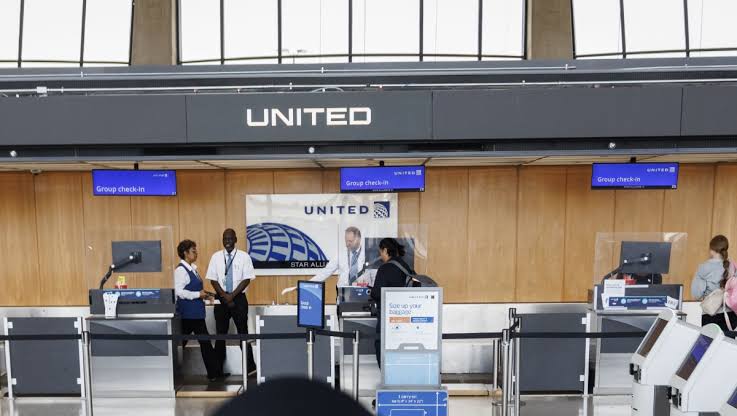Lufthansa Flight LH575 Makes Emergency Landing in Luanda After Engine Failure Over Angola
Lufthansa Flight LH575 Makes Emergency Landing in Luanda After Engine Failure Over Angola
In a dramatic mid-air emergency that highlighted the precision and preparedness of modern aviation crews, Lufthansa Flight LH575 was forced to make an emergency landing in Luanda, Angola, after experiencing a significant engine failure. The incident, which occurred on December 18, 2022, during the aircraft’s journey from Cape Town, South Africa, to Munich, Germany, brought attention to the challenges of long-haul flights over remote regions and the resilience of both passengers and airline staff in moments of crisis.
The Airbus A350-900 aircraft, one of Lufthansa’s newer wide-body jets, was carrying 271 passengers and 13 crew members on what was supposed to be an overnight transcontinental flight. However, about three hours into the journey, over Angolan airspace, a critical failure in the aircraft’s left engine forced the crew to divert and make an emergency landing at Quatro de Fevereiro International Airport in Luanda.
Incident Overview
According to initial reports released by Lufthansa and Angolan aviation authorities, the flight had departed Cape Town shortly after 7:30 PM local time and was cruising at 37,000 feet when the pilots received an alert indicating abnormal performance in the aircraft’s Rolls-Royce Trent XWB left engine. The engine reportedly began to lose thrust and vibrate beyond normal parameters. Pilots followed emergency protocols, reducing altitude and shutting down the affected engine to prevent further damage.
Passengers onboard were initially unaware of the extent of the issue. However, one passenger seated near the wing reported seeing flickering lights and hearing unusual mechanical noises. “There was a sort of whirring noise and then silence on one side of the plane,” said Claudia Richter, a German national returning home from a business trip. “The crew was calm, but you could tell something serious was happening.”
Flight LH575 then began a slow descent as it was rerouted to Luanda, the nearest suitable airport capable of accommodating the large aircraft. The flight crew declared an emergency and was granted priority clearance by air traffic control in Angola.
Landing in Luanda
The aircraft touched down safely in Luanda just before midnight local time. Emergency services were stationed on the runway, ready for any potential fire or structural damage, but the landing was executed flawlessly by the flight crew. Passengers were informed of the emergency only after the plane had landed and was taxiing to a remote stand at the airport.

Once disembarked, passengers were led into the airport’s international terminal, where Lufthansa ground staff and Angolan airport personnel began working to provide accommodations, meals, and visa assistance for those who did not hold Angolan entry documents. The sudden arrival of hundreds of international passengers required swift logistical coordination.
Lufthansa issued a statement shortly after the landing:
> “Flight LH575 en route from Cape Town to Munich diverted to Luanda following an engine anomaly. The aircraft landed safely, and all passengers and crew disembarked without injury. Lufthansa is cooperating with local authorities and maintenance teams to inspect the aircraft and resume service as soon as possible.”
Passenger Experience
While no injuries were reported, the unexpected detour left many passengers confused and concerned. For many, it was their first time in Angola, a country whose language, culture, and infrastructure were unfamiliar.
“It was surreal. One moment we were flying over Africa in the dark, and the next we’re in a completely new country trying to find out what happened,” said Alex Brandt, a South African graduate student studying in Germany.
Despite the disruption, Lufthansa’s customer care team received praise for its efforts to keep passengers informed, provide overnight hotel stays, and arrange meals and travel updates in both German and English. Some passengers, however, expressed frustration over delayed communication and long waits for accommodations.
Technical Details and Aircraft Inspection
The Airbus A350-900 is widely considered one of the most technologically advanced aircraft in commercial service, equipped with dual engines and sophisticated safety systems. The Trent XWB engines manufactured by Rolls-Royce are known for fuel efficiency and reliability. However, no system is entirely immune to failure.
Following the emergency landing, Lufthansa dispatched a technical team along with a replacement crew to Luanda. Maintenance inspections on the grounded aircraft revealed that the left engine had suffered a compressor stall—an uncommon but serious malfunction in which airflow through the engine is disrupted, leading to surges, power loss, and vibrations.
A Lufthansa spokesperson confirmed that parts would need to be flown in from Europe to complete repairs. The aircraft remained grounded in Luanda for approximately 20 hours before being cleared for a non-revenue ferry flight back to Germany for further evaluation.
Response from Angolan Authorities
Angolan aviation officials praised Lufthansa’s professionalism and coordination throughout the emergency. In a press release, the National Civil Aviation Authority of Angola stated:
> “We commend the Lufthansa flight crew for their skilled handling of the situation. Our air traffic controllers and emergency response teams responded swiftly and ensured the safe landing of the aircraft at Quatro de Fevereiro International Airport.”
The incident also provided a rare real-world test of Luanda’s airport emergency response capabilities, which are not frequently required for wide-body jet emergencies. The smooth landing and rapid support demonstrated Angola’s growing infrastructure and capacity to manage international aviation incidents.
Impact on Airline Operations
Lufthansa was quick to minimize disruption to its network. A replacement aircraft was deployed from Frankfurt to retrieve passengers who opted to continue their journey. Other travelers were rebooked onto alternate flights from Luanda or given the option to return to Cape Town and reschedule their trip at no additional cost.
The delay resulted in missed connections and schedule shifts across Lufthansa’s European hubs, particularly affecting travelers with plans to transit through Munich to other destinations in Europe and Asia. Airline analysts estimate that the financial impact of the emergency—including fuel diversion, maintenance, compensation, and aircraft downtime—likely reached several hundred thousand euros.
Passenger Reactions and Reflections
For many passengers, the incident served as a stark reminder of the complexities of air travel and the importance of contingency planning. Some expressed gratitude for being alive and well, while others criticized the emotional toll of uncertainty and lack of communication in the early hours following the diversion.
“I never thought I’d spend the night in Angola, but the important thing is that we landed safely,” said Monique Adler, a tourist returning from a safari. “The pilots were heroes in my book.”
A few passengers took to social media to share their experiences, posting pictures from inside the Luanda airport and praising Lufthansa for offering hotel vouchers and frequent updates.
Conclusion
The emergency landing of Lufthansa Flight LH575 in Luanda following engine failure over Angola stands as a testament to the training, preparedness, and professionalism of commercial aviation crews. Though the incident could have been far more severe, the quick thinking of the pilots, the resilience of the passengers, and the cooperation between international and local authorities ensured a safe and relatively calm resolution.
As investigations and inspections continue, the aviation community will review the incident closely for insights into engine safety, mid-flight emergency procedures, and the reliability of long-haul aircraft operating over remote territories. Lufthansa has since resumed normal operations on the route, though the memory of the December 2022 incident remains fresh for those who lived through it—an unexpected detour that transformed an ordinary flight into a story of calm under pressure and cross-border coordination.





